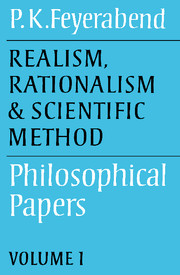Book contents
- Frontmatter
- Contents
- Introduction to volumes 1 and 2
- PART I ON THE INTERPRETATION OF SCIENTIFIC THEORIES
- PART 2 APPLICATIONS AND CRITICISMS
- 8 Introduction: proliferation and realism as methodological principles
- 9 Linguistic arguments and scientific method
- 10 Materialism and the mind–body problem
- 11 Realism and instrumentalism
- 12 A note on the problem of induction
- 13 On the quantum theory of measurement
- 14 Professor Bohm's philosophy of nature
- 15 Reichenbach's interpretation of quantum mechanics
- 16 Niels Bohr's world view
- 17 Hidden variables and the argument of Einstein, Podolsky and Rosen
- Sources
- Name index
- Subject index
17 - Hidden variables and the argument of Einstein, Podolsky and Rosen
Published online by Cambridge University Press: 05 June 2012
- Frontmatter
- Contents
- Introduction to volumes 1 and 2
- PART I ON THE INTERPRETATION OF SCIENTIFIC THEORIES
- PART 2 APPLICATIONS AND CRITICISMS
- 8 Introduction: proliferation and realism as methodological principles
- 9 Linguistic arguments and scientific method
- 10 Materialism and the mind–body problem
- 11 Realism and instrumentalism
- 12 A note on the problem of induction
- 13 On the quantum theory of measurement
- 14 Professor Bohm's philosophy of nature
- 15 Reichenbach's interpretation of quantum mechanics
- 16 Niels Bohr's world view
- 17 Hidden variables and the argument of Einstein, Podolsky and Rosen
- Sources
- Name index
- Subject index
Summary
THE ARGUMENT
Opponents of Bohr's interpretation often refer to an argument by Einstein, Podolsky and Rosen, (EPR) according to which, the formalism of wave mechanics is such that it demands the existence of exact simultaneous values of non-commuting variables. Clearly, if this should be the case, then Bohr's interpretation of the uncertainty relations would have to be dropped and it would have to be replaced by the interpretation of Einstein and Popper. At the same time all those difficulties which prompted Bohr to invent the hypothesis of the indefiniteness of state descriptions would reappear. Even worse, it would seem that an inconsistency has been discovered in the very foundations of the quantum theory. For if it should indeed be the case that the only way of combining duality, the quantum postulate and the conservation laws consists in assuming indefiniteness of state descriptions, then the case of Einstein, Podolsky and Rosen would show that wave mechanics is intrinsically unable to allow for a coherent account embracing these three experimental facts. We now turn to a closer analysis of the argument.
Assume that a system S (coordinates q, q′, q″ …, qn, r, r′, rn, …, rm; or (qr) for short) which is in the state Φ (qr) has been (either mentally, or by physical separation) divided into two subsystems, S′ (q) and S″ (r).
- Type
- Chapter
- Information
- Realism, Rationalism and Scientific MethodPhilosophical Papers, pp. 298 - 342Publisher: Cambridge University PressPrint publication year: 1981
- 3
- Cited by



